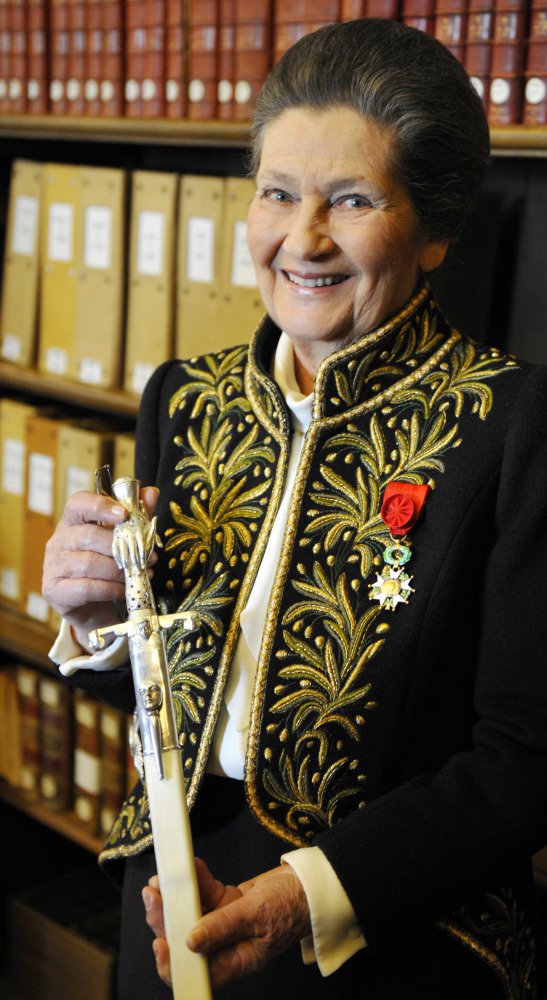PARIS — Simone Veil, a survivor of Nazi death camps and a European Parliament president who spearheaded abortion rights as one of France’s most prominent female politicians, died Friday at 89, her family said.
A funeral ceremony with military honors is to be held on Wednesday at Les Invalides, site of Napoleon’s tomb, the presidential Elysee Palace said. In a measure of the nation’s esteem for Veil, French flags will be dressed in black ribbons and European flags will fly at half-staff.
“May her example inspire our compatriots,” President Emmanuel Macron tweeted.
“France has lost a figure that history rarely produces,” Prime Minister Edouard Philippe said as tributes to the centrist Veil poured in from across the political spectrum.
Veil said it was her experiences in the Nazi concentration camps that made her a firm believer in the unification of Europe.
“The idea of war was for me something terrible,” she told The Associated Press in a 2007 interview. “The only possible option was to make peace.”
CONDOLENCES FROM MERKEL
Her own rise from a former deportee to the head of the European Parliament was a potent symbol of that sought-after peace, she said.
German Chancellor Angela Merkel, offering condolences in a message to Veil’s son, said she was “very grateful” for Veil’s commitment to European unification.
“We will also remember her tireless … commitment to the survivors of the Holocaust, whose fate she shared,” Merkel wrote.
A two-time Cabinet minister, Veil was best known in France for leading the heated battle to legalize abortion in the 1970s. France’s abortion rights law is still known four decades later as the “Loi Veil,” and she called it her proudest accomplishment.
In a country where many women are hesitant to call themselves feminists, Veil embraced the label. She saw herself as an advocate for the downtrodden and devoted much of her early career to improving conditions in French prisons. Later, she became one of the most visible faces of France’s dwindling community of Holocaust survivors and spoke passionately about the need to keep the memory alive.
Born Simone Jacob in the Mediterranean port of Nice on July 13, 1927, she was one of four children. Her father worked as an architect until a 1941 law by France’s collaborationist Vichy government forced him – and other Jews – out of the profession.
In March 1944, the Gestapo arrested and deported Veil, her parents and all but one of her siblings. The 16-year-old Veil, her sister and her mother ended up at the death camps at Auschwitz-Birkenau.
Her father and brother were sent to a camp in a Baltic country. They were never seen again.
“I found myself thrown into a universe of death, humiliation and barbarism,” Veil wrote in the preface to a 2005 book on the Holocaust. “I am still haunted by the images, the odors, the screams, the humiliation, the blows and the sky, ashen with the smoke from the crematoriums.”
Young and healthy when she entered Birkenau and with striking chestnut plaits, Veil caught the eye of a Polish woman who helped run the camp. The woman took her aside, telling her in broken French: “‘You are too pretty to die here. I am going to find some way so you can survive,”‘ Veil told the AP.
The woman sent Veil, her mother and sister to work at a Siemens factory outside the camp. Later, Veil was transferred to work in an SS kitchen, where she was able to pilfer bits of food for her mother.
Her efforts were in vain. Veil’s mother died of typhus at the Bergen-Belsen camp. Veil’s sister survived the camp, returning to France along with Veil after the war.
Upon her return, Veil pursued a law degree at Paris’ prestigious Institut d’Etudes Politiques. There she met Antoine Veil, a public servant, and the two married in 1946.
Simone Veil became a judge and worked for seven years in France’s department of corrections, where she fought to improve prison conditions.
“Having had my freedom taken away gave me a real sense of empathy for prisoners,” Veil said.
In 1974, center-right President Valery Giscard d’Estaing plucked her out of relative obscurity, appointing her health minister – to her surprise. The appointment thrust her into the center of the fight over abortion, which Giscard d’Estaing had pledged to legalize.
The most visible proponent of the controversial legislation, Veil quickly became the target of vicious, personal attacks as the battle over the bill raged in the legislature. One anti-abortion lawmaker’s comment that Veil “wanted to send children to the ovens” famously reduced her to tears.
Veil again served as French health minister from 1993-1995 under Prime Minister Edouard Balladur.
In 1979, Veil ran in the European Parliament’s first popular elections on the Center for Europe party ticket. Fellow lawmakers elected her president, making her the first woman to head the legislature. She served as president until 1982 and remained in the Parliament until 1993.
Veil returned to Auschwitz to commemorate the 60th anniversary of its liberation in January 2005. By then, Auschwitz “was just a bunch of crumbling buildings,” she told the AP. “Without the people doing the killing, it was no longer a frightening place.”
Veil’s political popularity took a bruising when she came out in support of conservative Nicolas Sarkozy in the 2007 presidential election. Critics lashed out at Veil for endorsing a candidate known for his tough stance on illegal immigration and who created a Ministry of Immigration and National Identity.
Veil said she was surprised by the attacks but largely shrugged them off. More than 30 years after the abortion battle, she said she still got hate mail on the issue.
“I am used to such abuse,” Veil said.
In 2010, she was inducted into the Academie Francaise, becoming the sixth woman to join the guardian of the French language since it was founded in 1635.
Send questions/comments to the editors.


